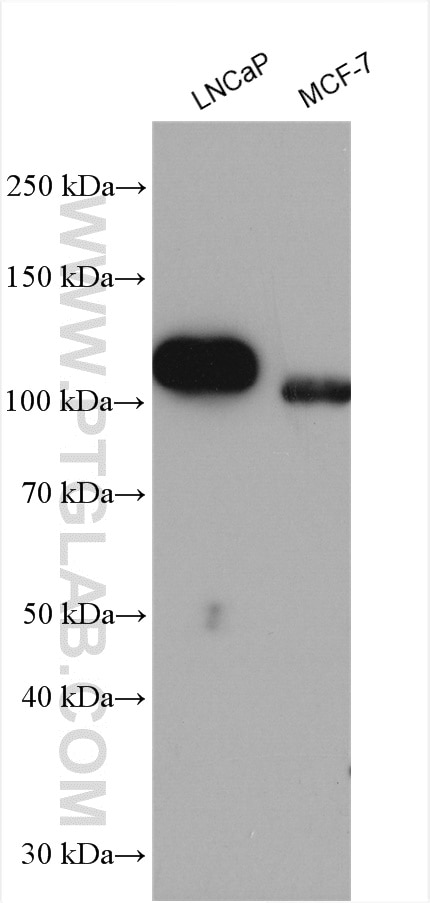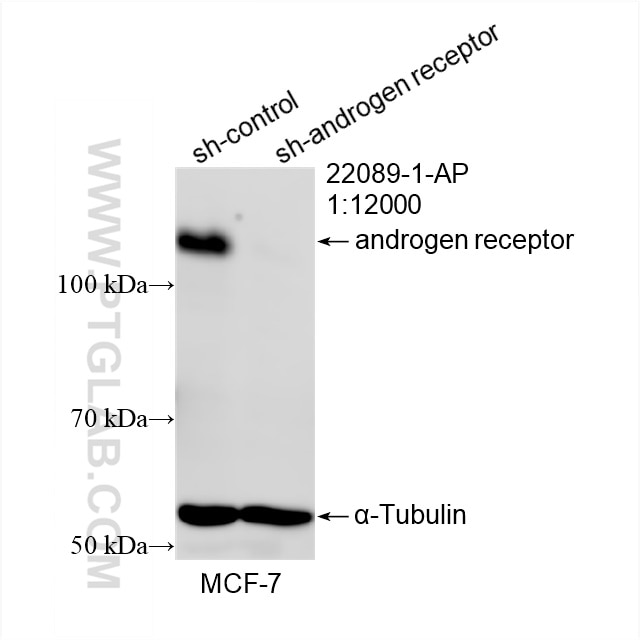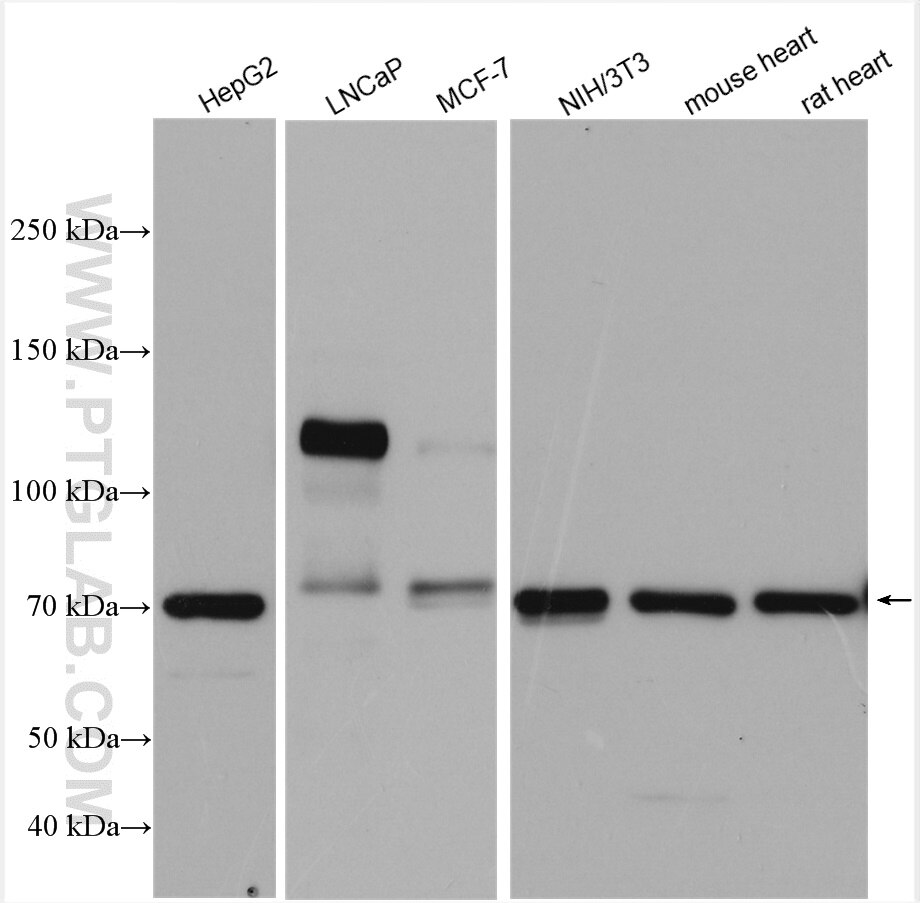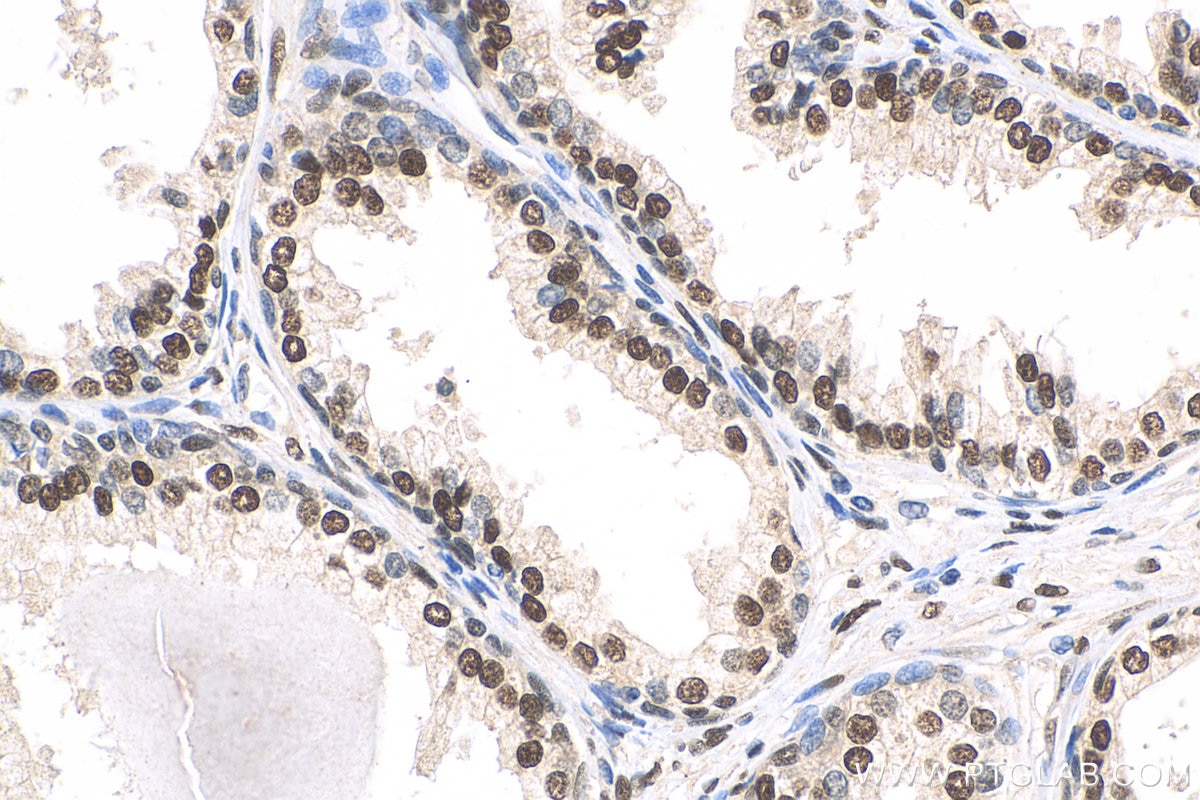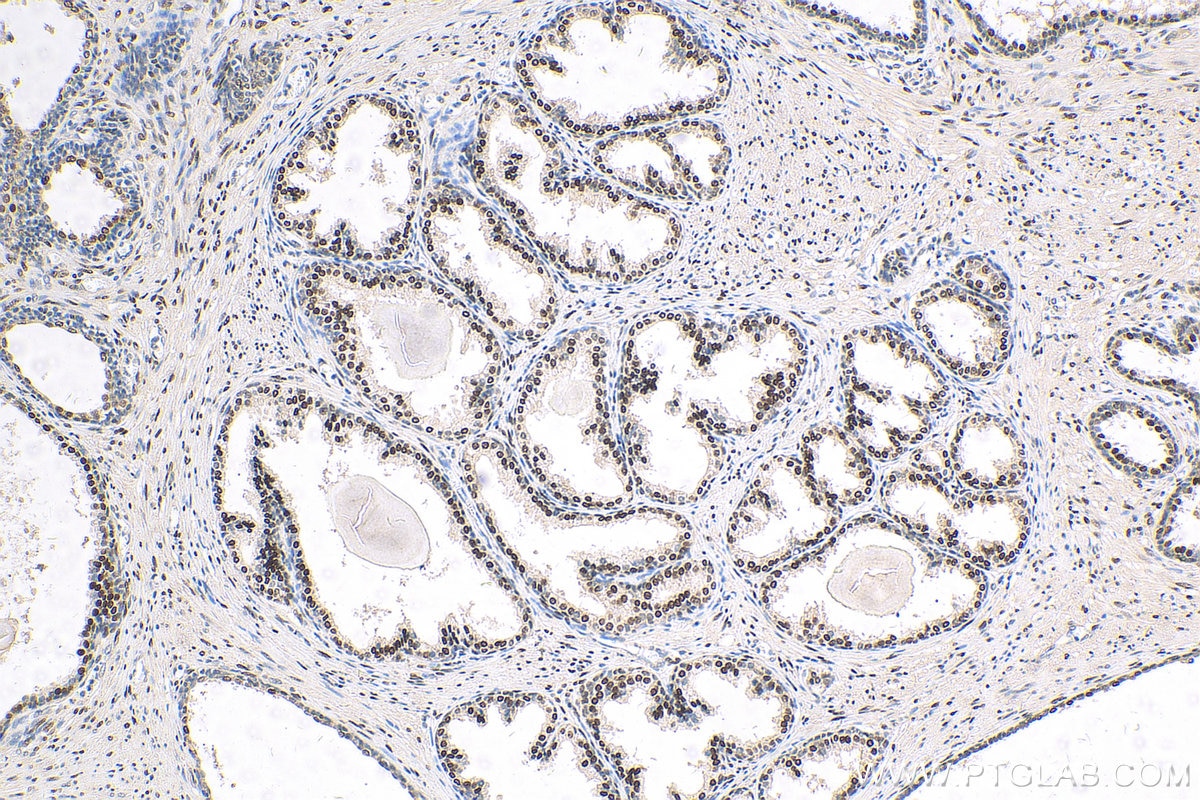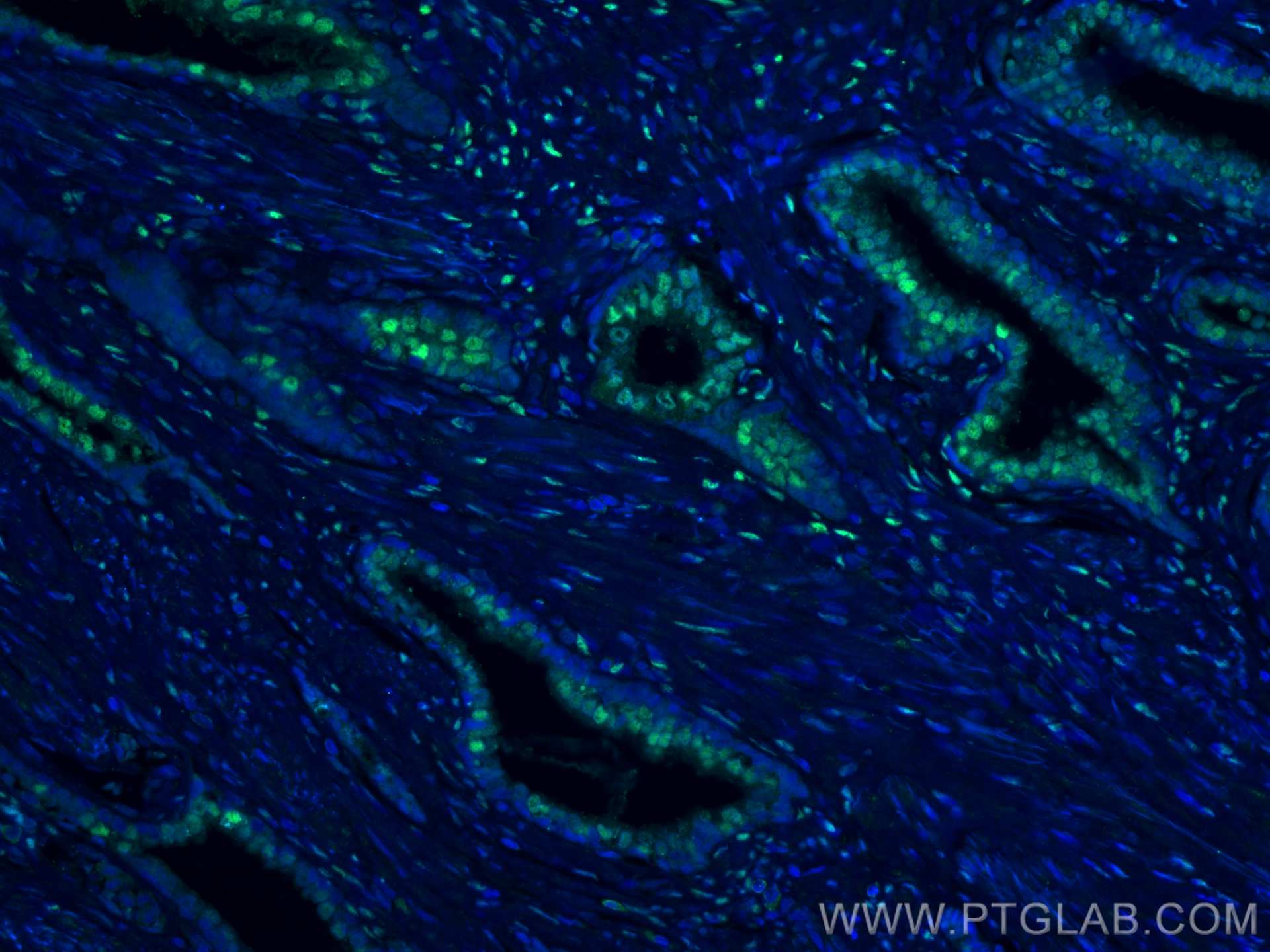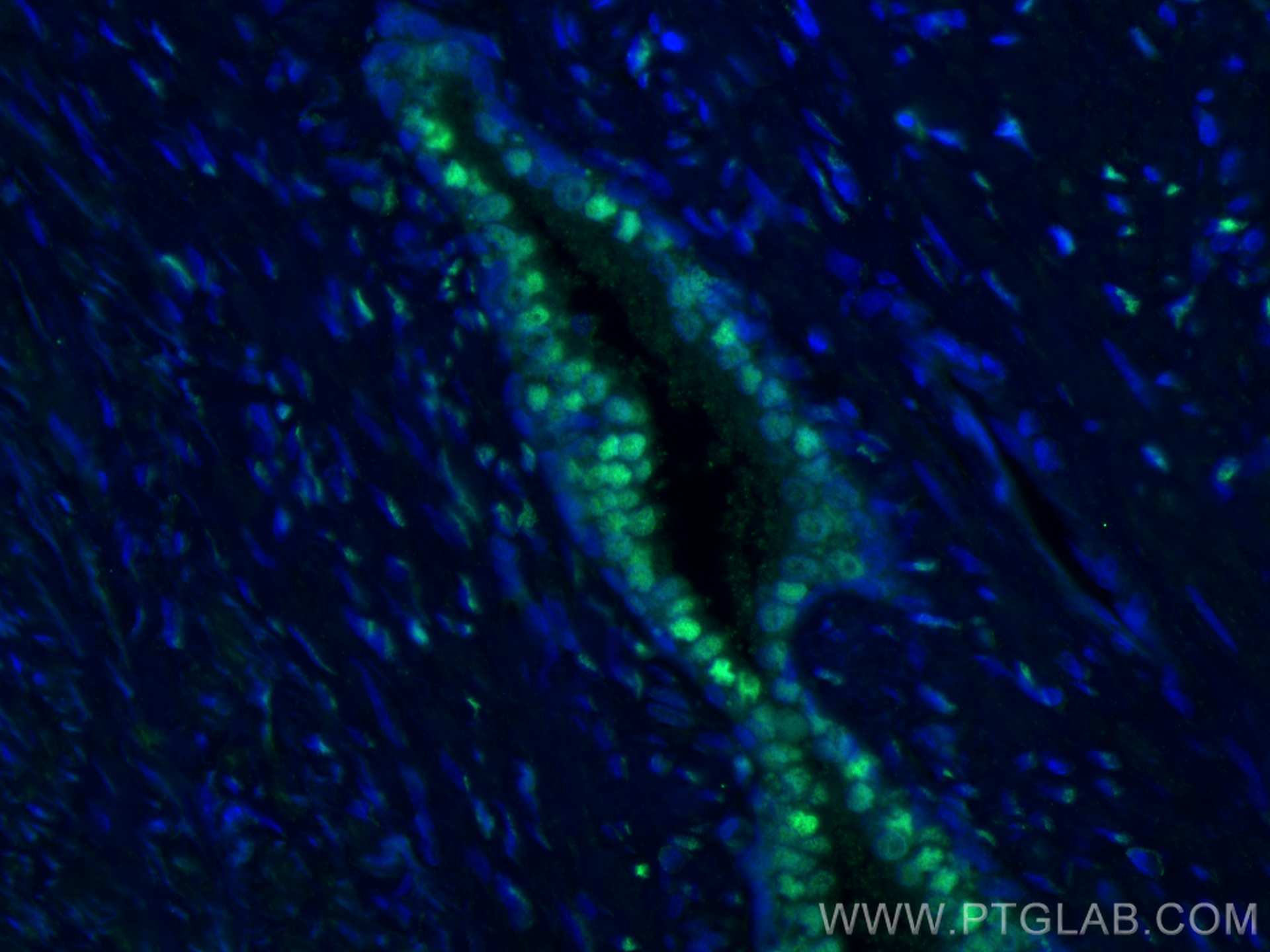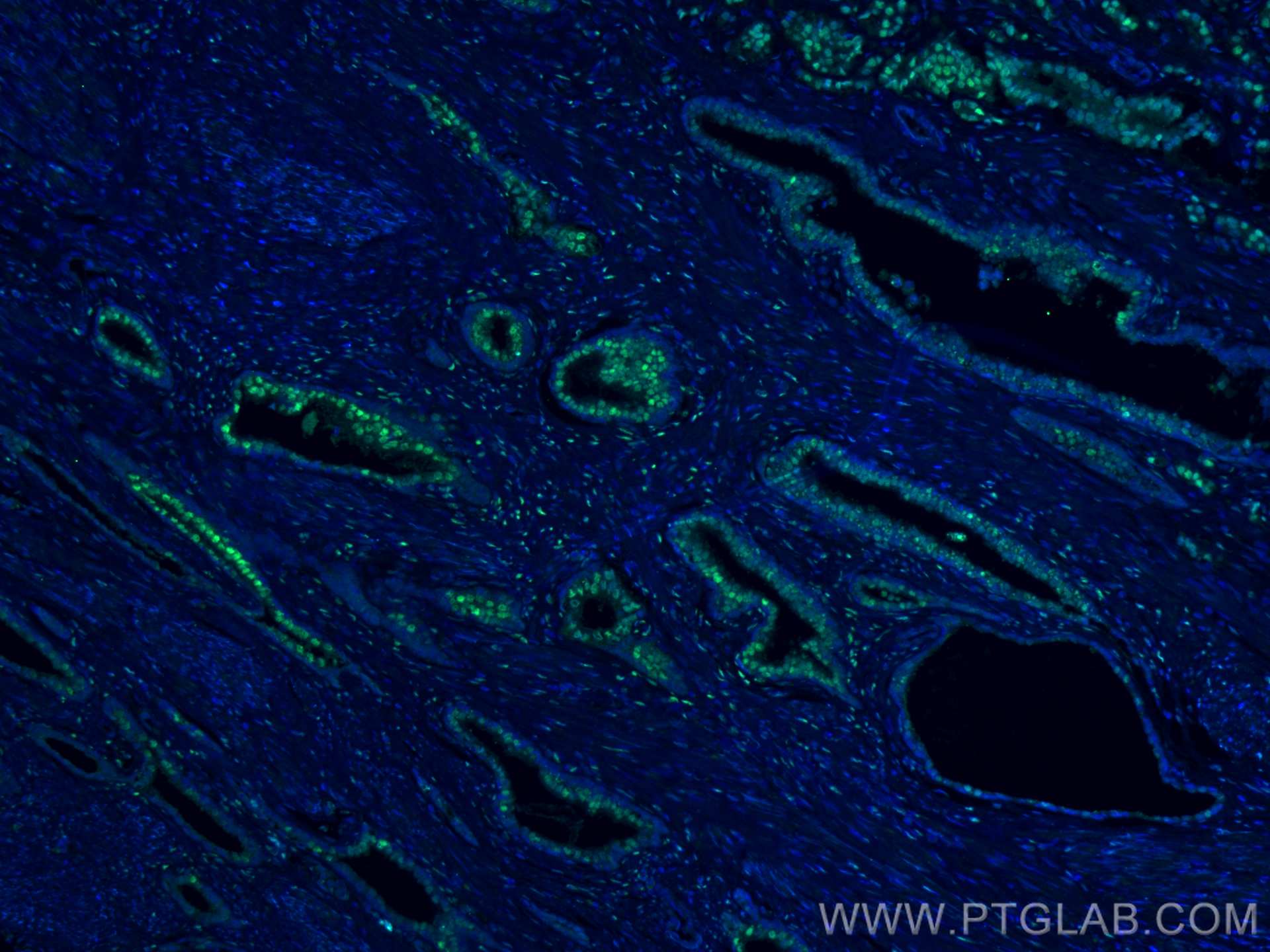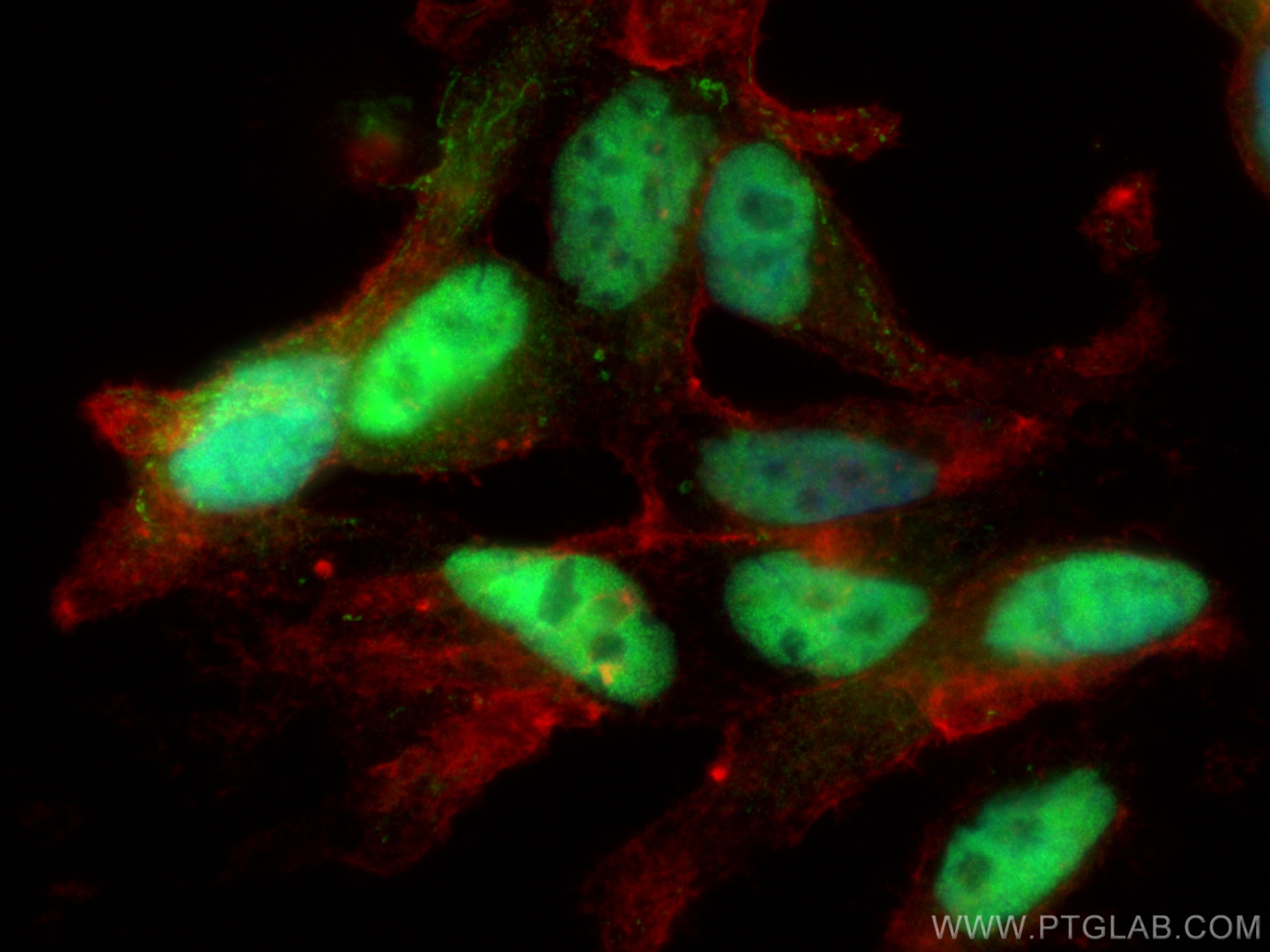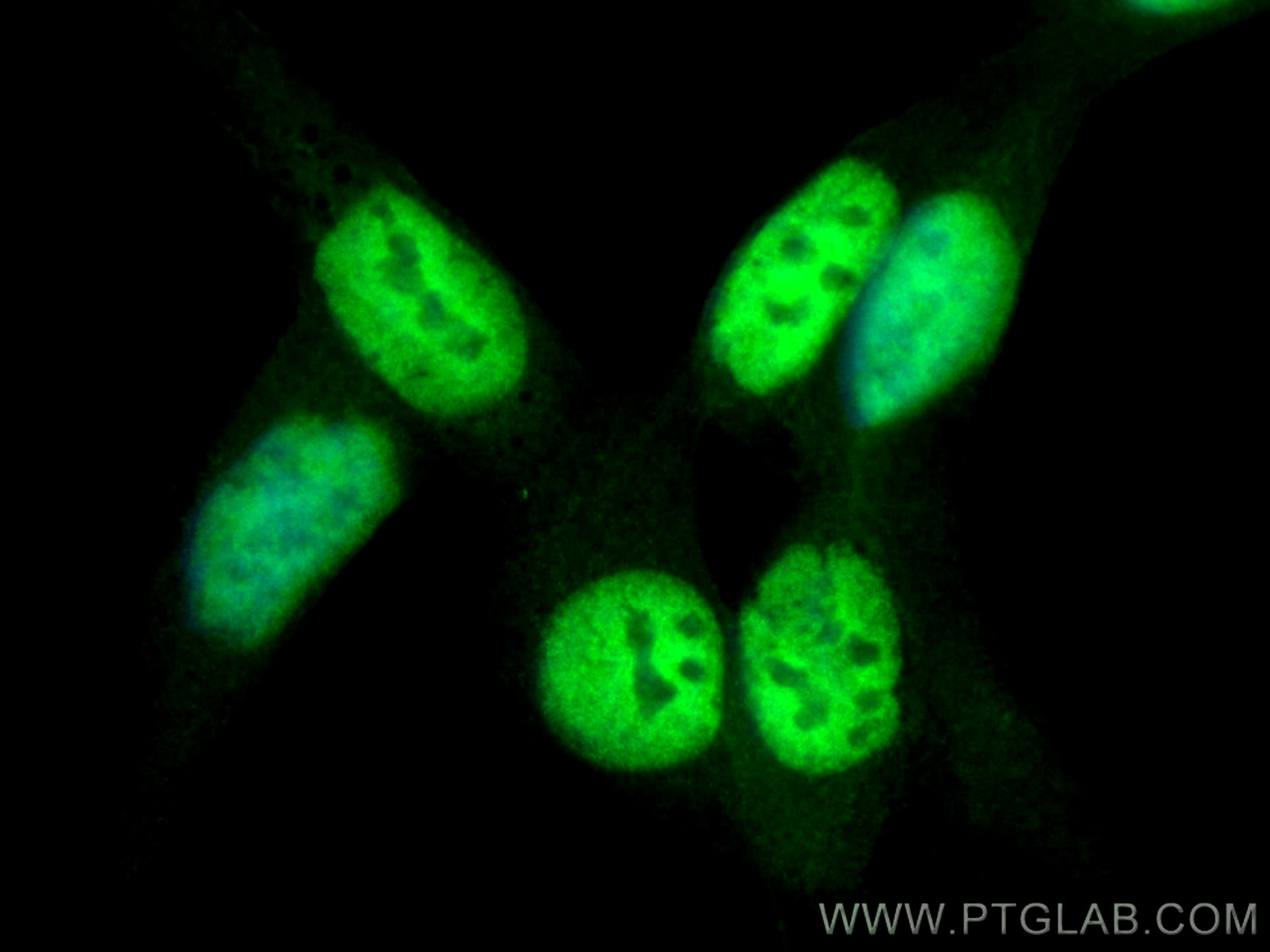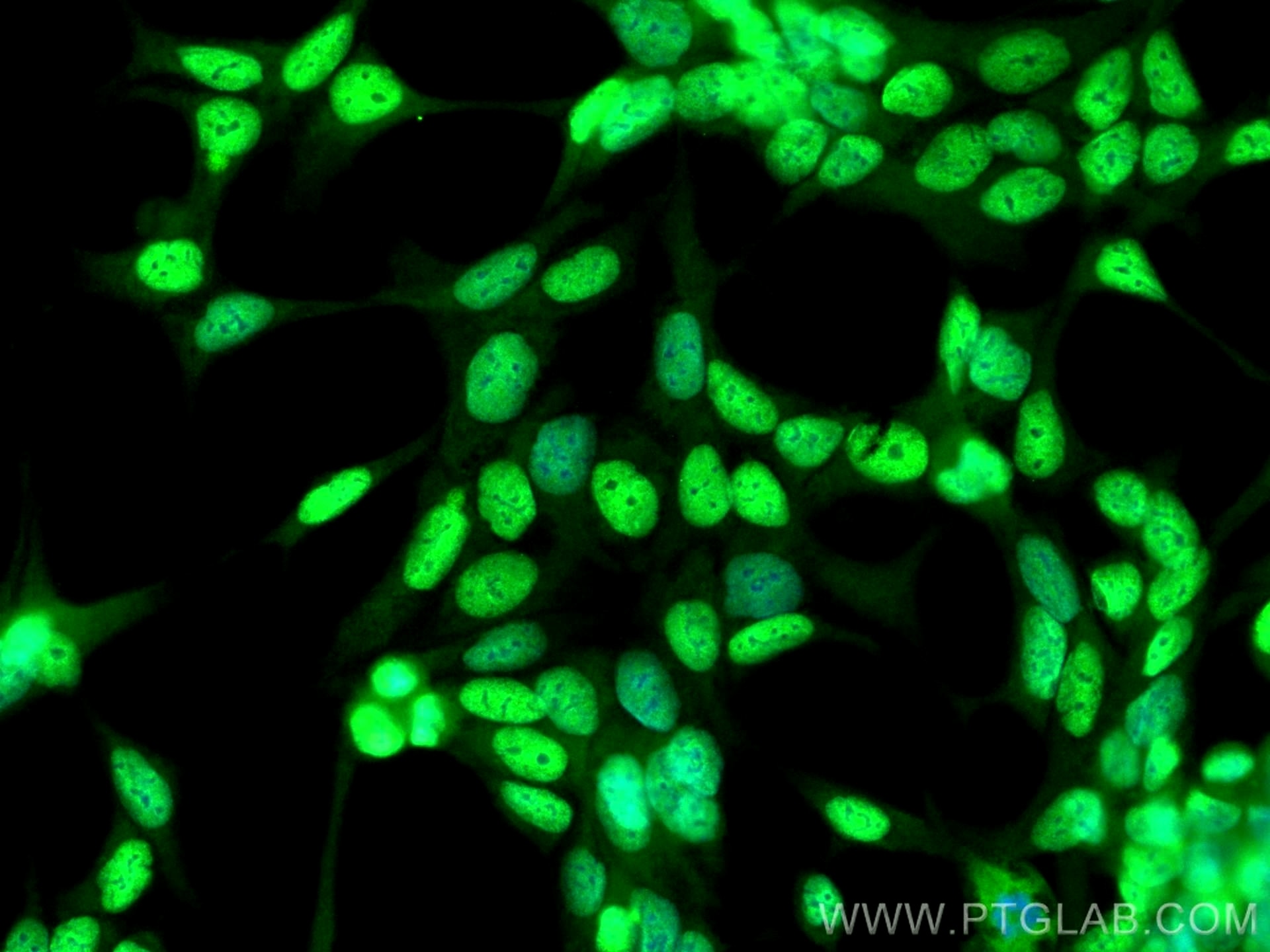Validation Data Gallery
Tested Applications
| Positive WB detected in | LNCaP cells, HepG2 cells, MCF-7 cells, NIH/3T3 cells, mouse heart tissue, rat heart tissue |
| Positive IHC detected in | human prostate cancer tissue Note: suggested antigen retrieval with TE buffer pH 9.0; (*) Alternatively, antigen retrieval may be performed with citrate buffer pH 6.0 |
| Positive IF-P detected in | human prostate cancer tissue |
| Positive IF/ICC detected in | LNCaP cells |
Recommended dilution
| Application | Dilution |
|---|---|
| Western Blot (WB) | WB : 1:5000-1:50000 |
| Immunohistochemistry (IHC) | IHC : 1:200-1:800 |
| Immunofluorescence (IF)-P | IF-P : 1:50-1:500 |
| Immunofluorescence (IF)/ICC | IF/ICC : 1:200-1:800 |
| It is recommended that this reagent should be titrated in each testing system to obtain optimal results. | |
| Sample-dependent, Check data in validation data gallery. | |
Published Applications
| KD/KO | See 1 publications below |
| WB | See 48 publications below |
| IHC | See 15 publications below |
| IF | See 13 publications below |
| IP | See 1 publications below |
| ChIP | See 1 publications below |
Product Information
22089-1-AP targets androgen receptor in WB, IHC, IF/ICC, IF-P, IP, ChIP, ELISA applications and shows reactivity with human, mouse, rat samples.
| Tested Reactivity | human, mouse, rat |
| Cited Reactivity | human, mouse, rat, pig |
| Host / Isotype | Rabbit / IgG |
| Class | Polyclonal |
| Type | Antibody |
| Immunogen | androgen receptor fusion protein Ag17291 相同性解析による交差性が予測される生物種 |
| Full Name | androgen receptor |
| Calculated molecular weight | 914 aa, 99 kDa |
| Observed molecular weight | 75-80 kDa, 110-120 kDa |
| GenBank accession number | BC132975 |
| Gene Symbol | AR |
| Gene ID (NCBI) | 367 |
| RRID | AB_11182176 |
| Conjugate | Unconjugated |
| Form | Liquid |
| Purification Method | Antigen affinity purification |
| UNIPROT ID | P10275 |
| Storage Buffer | PBS with 0.02% sodium azide and 50% glycerol{{ptg:BufferTemp}}7.3 |
| Storage Conditions | Store at -20°C. Stable for one year after shipment. Aliquoting is unnecessary for -20oC storage. |
Background Information
1. What is the molecular weight of AR? Are there any isoforms of AR?
The molecular weight of full-length androgen receptor (AR-B) is 110 kDa. An additional variant, AR-A, has an 87 kDa size and lacks the N-terminal 187 amino acids of AR-A (PMID: 8108393). Recently, more splice variants of AR have been discovered, raising protein products of around 80 kDa length (PMID: 19244107), as well as an AR45 variant of 45 kDa size (PMID: 15634333). AR splice variants differ in their cell line-specific expression (PMID: 24570075).
2. What is the subcellular localization of AR?
AR can be present in either or both of the cytoplasm and nucleus. In androgen-deprived cells, AR is found predominantly in the cytoplasm, while stimulation by androgens causes enrichment of androgen-bound AR in the nucleus. AR shuttles between the cytoplasm and nucleus and its phosphorylation state has an impact on the subcellular localization (PMID: 16282370).
3. Is AR post-translationally modified?
Post-translational modifications of the AR include phosphorylation, acetylation, methylation, SUMOylation, and ubiquitination (PMID: 21820033). These modifications have an impact on receptor stability, activity, and can change the observed molecular weight of the AR.
4. How to study AR signaling in cell culture?
It is important to control levels of cell stimulation while also looking at AR signaling. Fetal bovine serum (FBS) that is typically used in cell culture contains low levels of testosterone that are enough to stimulate the growth of prostate cells (PMID: 19676093), including the LNCaP cell line that is a commonly used human prostatic carcinoma cell model (PMID: 6831420). One possibility for complete testosterone deprivation is to use charcoal stripped FBS that removes lipophilic agents, including androgens. It is also not recommended to use phenol red in your medium because it is a weak estrogen (PMID: 3458212). Cell stimulation is often conducted by dihydrotestosterone (DHT).
5. What is the role of AR in prostate cancer?
AR plays a key role in the development and physiology of the prostate gland, and also cancer progression (PMID: 15082523). Mutations in AR altering ligands have been observed. The progression of the prostate cancer depends on AR activity and therefore blocking AR activity or lowering androgen levels is a key step related to androgen deprivation therapy (ADT).
Protocols
| Product Specific Protocols | |
|---|---|
| WB protocol for androgen receptor antibody 22089-1-AP | Download protocol |
| IHC protocol for androgen receptor antibody 22089-1-AP | Download protocol |
| IF protocol for androgen receptor antibody 22089-1-AP | Download protocol |
| Standard Protocols | |
|---|---|
| Click here to view our Standard Protocols |
Publications
| Species | Application | Title |
|---|---|---|
Nucleic Acids Res SMAD3 promotes expression and activity of the androgen receptor in prostate cancer | ||
Research (Wash D C) The FTO Mediated N6-Methyladenosine Modification of DDIT4 Regulation with Tumorigenesis and Metastasis in Prostate Cancer | ||
Oncogene Identification of low-frequency variants of UGT1A3 associated with bladder cancer risk by next-generation sequencing. | ||
Biomed Pharmacother Therapeutic targeting of histone lysine demethylase KDM4B blocks the growth of castration-resistant prostate cancer | ||
J Transl Med CAPN2 promotes apalutamide resistance in metastatic hormone-sensitive prostate cancer by activating protective autophagy | ||
J Environ Sci (China) The effects of 17β-trenbolone and bisphenol A on sexual behavior and social dominance via the hypothalamic-pituitary-gonadal axis in male mice |
